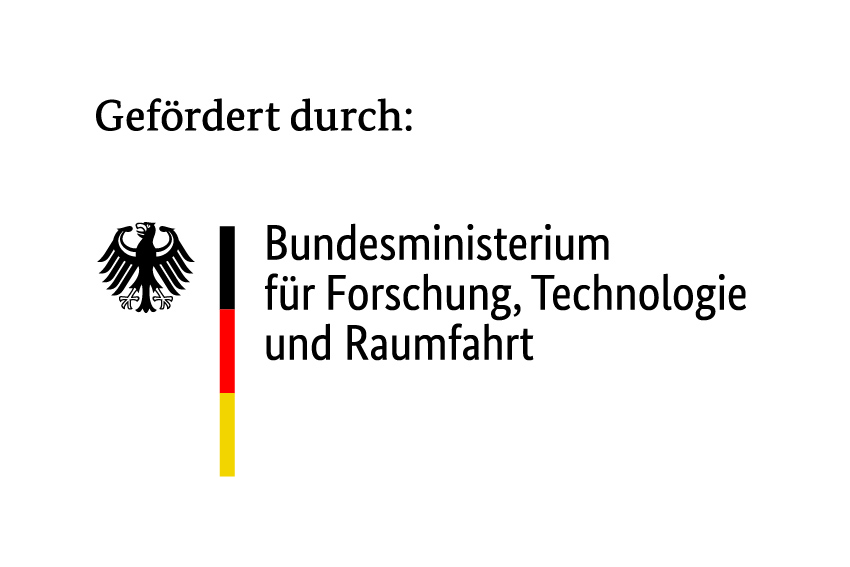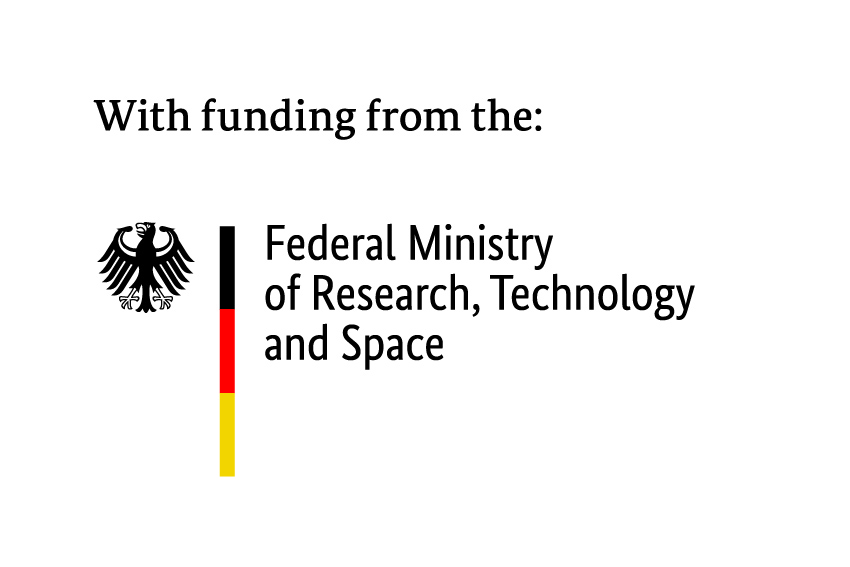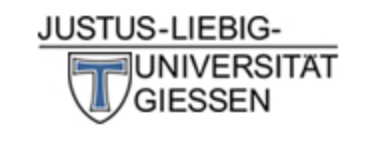Szenarioanalyse als ein Werkzeug für Investor:innen, Unternehmen und Regulatoren auf dem Weg hin zu Klimaneutralität
SATISFY – Scenario Analysis as a Tool for Investor, Firms and Regulators on the path to climate neutrality
Die Szenarioanalyse ist ein wichtiges Instrument, um die potenziellen Auswirkungen dieser klimabedingten Strukturveränderungen zu erkennen und zu verstehen. Das Projekt SATISFY wird untersuchen, wie die Szenarioanalyse als Instrument zur Bewertung, zum Management und zur Kommunikation von unternehmensspezifischen Klimarisiken und -chancen dienen und somit den Übergang zu einer klimaneutralen Wirtschaft unterstützen kann. Übergreifend wird analysiert, welche Szenarien im deutschen Markt und international genutzt werden, wie sich diese unterscheiden und welche Hürden hinsichtlich der Nutzung bestehen.
Im Detail wird der Einsatz von Szenarien für drei Unternehmens-/Asset-Typen analysiert, die für den Wandel entscheidend sind:
- emissionsintensive Produktionsunternehmen, KMU und Gebäude-/Immobilienunternehmen.
- Als thematischer roter Faden zieht sich die Frage nach der Übertragbarkeit makroökonomischen Klimaszenarien auf die Unternehmensebene durch alle drei Unternehmens-/Asset-Typen.
- Schließlich wird SATISFY die Analyse auf die Ebene der Finanzinstitute übertragen, um zu verstehen, wie der Finanzsektor seine Klimarisiken angemessener bewerten kann.
Teilprojekt 1: Analyse energieintensiver Industrien sowie Banken und KMU

Prof. Dr. Ulf Moslener
- u.moslener@fs.de
- Frankfurt School of Finance & Management gGmbH
- Frankfurt am Main
Teilprojekt 2: Grundlagen der Szenarienanalyse sowie Analyse von Industrie und Gebäuden

Prof. Dr. Karsten Neuhoff
Teilprojekt 3: Analyse des Finanzsektors und übergreifende Handlungsempfehlungen

Publikationen von SATISFY
SATISFY I Are sustainability-linked loans designed to effectively incentivize corporate sustainability? A framework for review
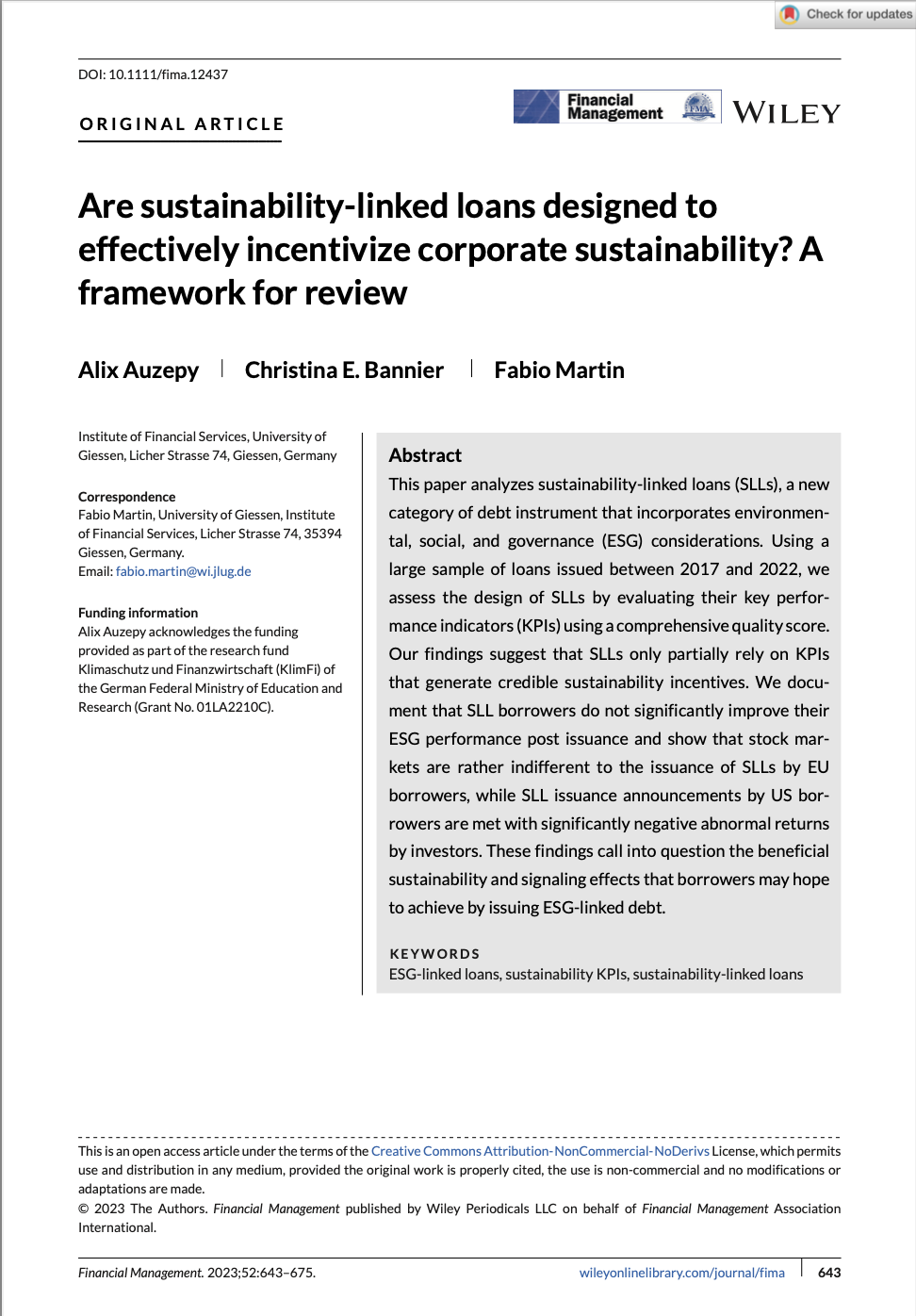
Are sustainability-linked loans designed to effectively incentivize corporate sustainability? A framework for review
This paper analyzes sustainability-linked loans (SLLs), a new category of debt instrument that incorporates environmen- tal, social, and governance (ESG) considerations. Using a large sample of loans issued between 2017 and 2022, we assess the design of SLLs by evaluating their key perfor- mance indicators (KPIs) using a comprehensive quality score. Our findings suggest that SLLs only partially rely on KPIs that generate credible sustainability incentives. We docu- ment that SLL borrowers do not significantly improve their ESG performance post issuance and show that stock mar- kets are rather indifferent to the issuance of SLLs by EU borrowers, while SLL issuance announcements by US bor- rowers are met with significantly negative abnormal returns by investors. These findings call into question the beneficial sustainability and signaling effects that borrowers may hope to achieve by issuing ESG-linked debt.
- Veröffentlichungsdatum: 03.10.2023
- Autor:innen: Alix Auzepy, Christina E. Bannier & Fabio Martin
- Publikationsart: Article
- Link zum PDF-Dokument
SATISFY I Climate scenarios in banks a case study
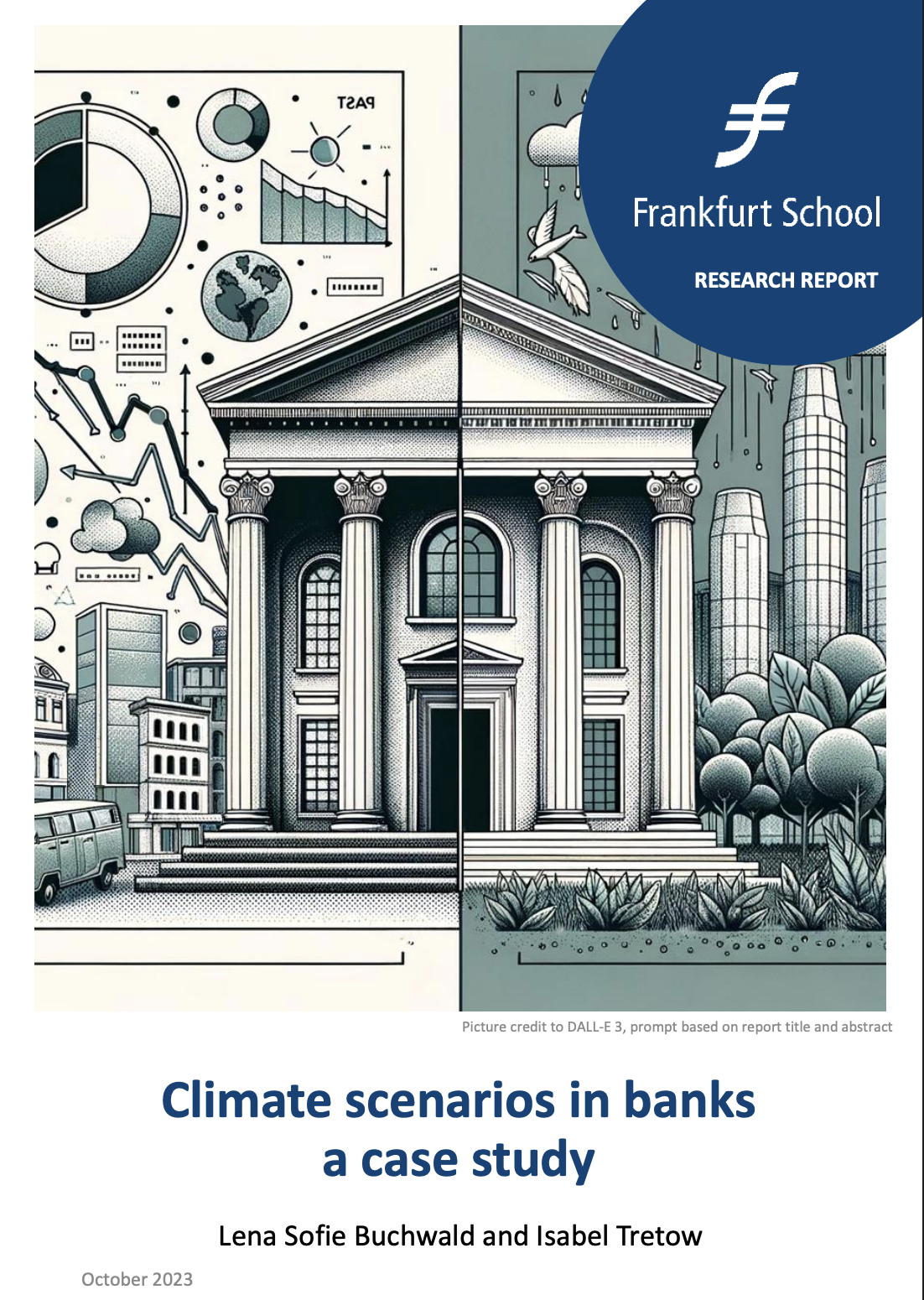
Climate scenarios in banks a case study
In this report, we develop and apply a typology that helps banks differentiate climate scenarios based on their characteristics and discuss four use cases. With the increasing importance of climate scenarios for assessing the risks and opportunities of climate change in the financial system, banks face the question of which climate scenarios to select for different use cases. We review academic and grey literature to develop a typology that helps banks differentiate climate scenarios using a heuristics approach. We differentiate commonly used scenarios based on the typology. We then apply the typology through a case study in a large German promotional bank. Being the first case study with a bank in this field, the paper adds to the literature by providing a characterisation of climate scenarios for banks and by supporting the selection of a climate scenario amongst banks.
- Veröffentlichungsdatum: 20.10.2023
- Autor:innen: Lena Sofie Buchwald and Isabel Tretow
- Publikationsart: Report
- Link zum PDF-Dokument
SATISFY I European corporate sustainability reporting - The Financial Materiality Compass as an auxiliary tool
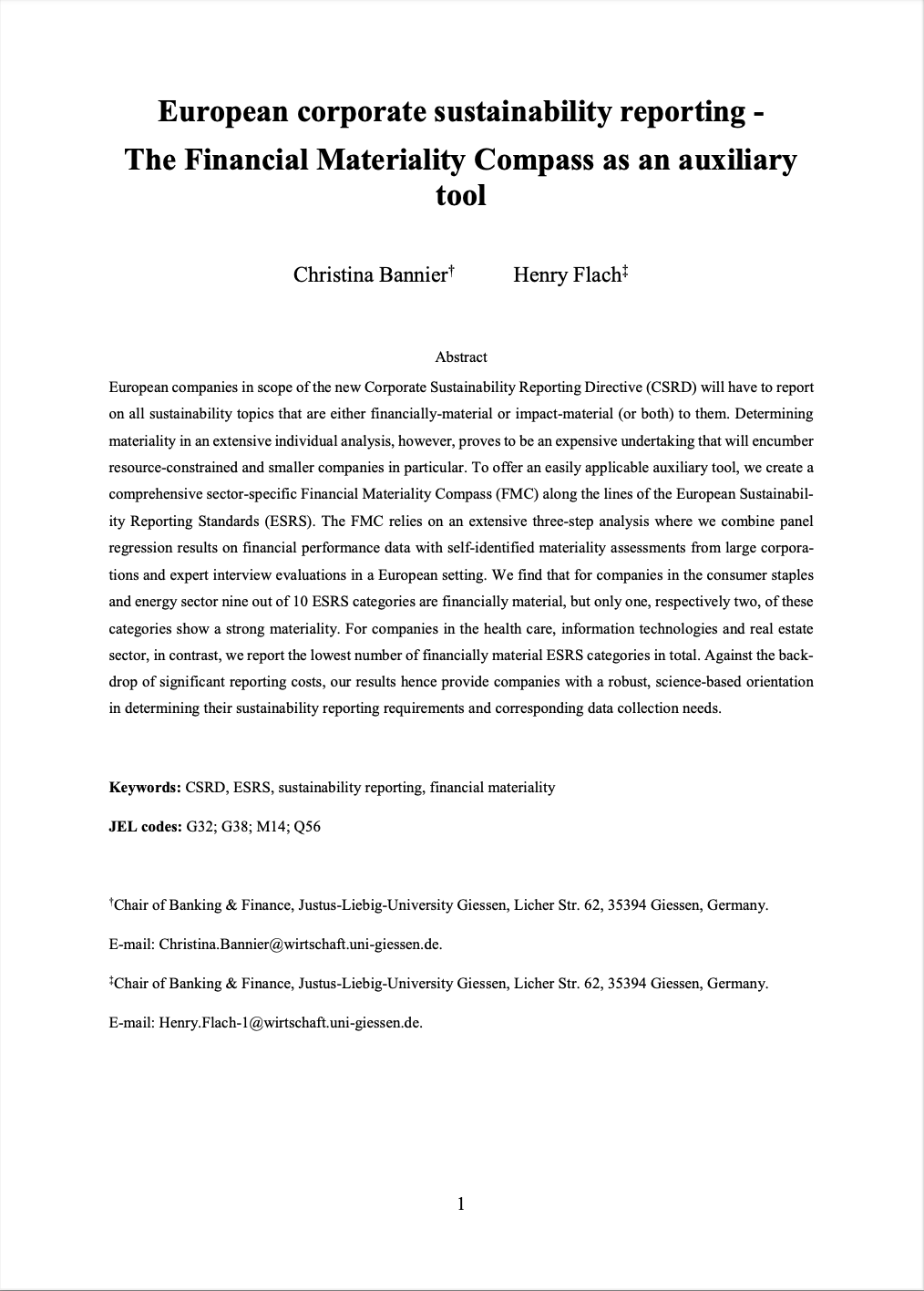
European corporate sustainability reporting - The Financial Materiality Compass as an auxiliary tool
European companies in scope of the new Corporate Sustainability Reporting Directive (CSRD) will have to report on all sustainability topics that are either financially-material or impact-material (or both) to them. Determining materiality in an extensive individual analysis, however, proves to be an expensive undertaking that will encumber resource-constrained and smaller companies in particular. To offer an easily applicable auxiliary tool, we create a comprehensive sector-specific Financial Materiality Compass (FMC) along the lines of the European Sustainabil-ity Reporting Standards (ESRS). The FMC relies on an extensive three-step analysis where we combine panel regression results on financial performance data with self-identified materiality assessments from large corpora-tions and expert interview evaluations in a European setting. We find that for companies in the consumer staples and energy sector nine out of 10 ESRS categories are financially material, but only one, respectively two, of these categories show a strong materiality. For companies in the health care, information technologies and real estate sector, in contrast, we report the lowest number of financially material ESRS categories in total. Against the back-drop of significant reporting costs, our results hence provide companies with a robust, science-based orientation in determining their sustainability reporting requirements and corresponding data collection needs.
- Veröffentlichungsdatum: 08.02.2024
- Autor:innen: Christina Bannier & Henry Flach
- Publikationsart: Paper
- Link zum PDF-Dokument
SATISFY I Evaluating TCFD reporting - A new application of zero-shot analysis to climate-related financial disclosures
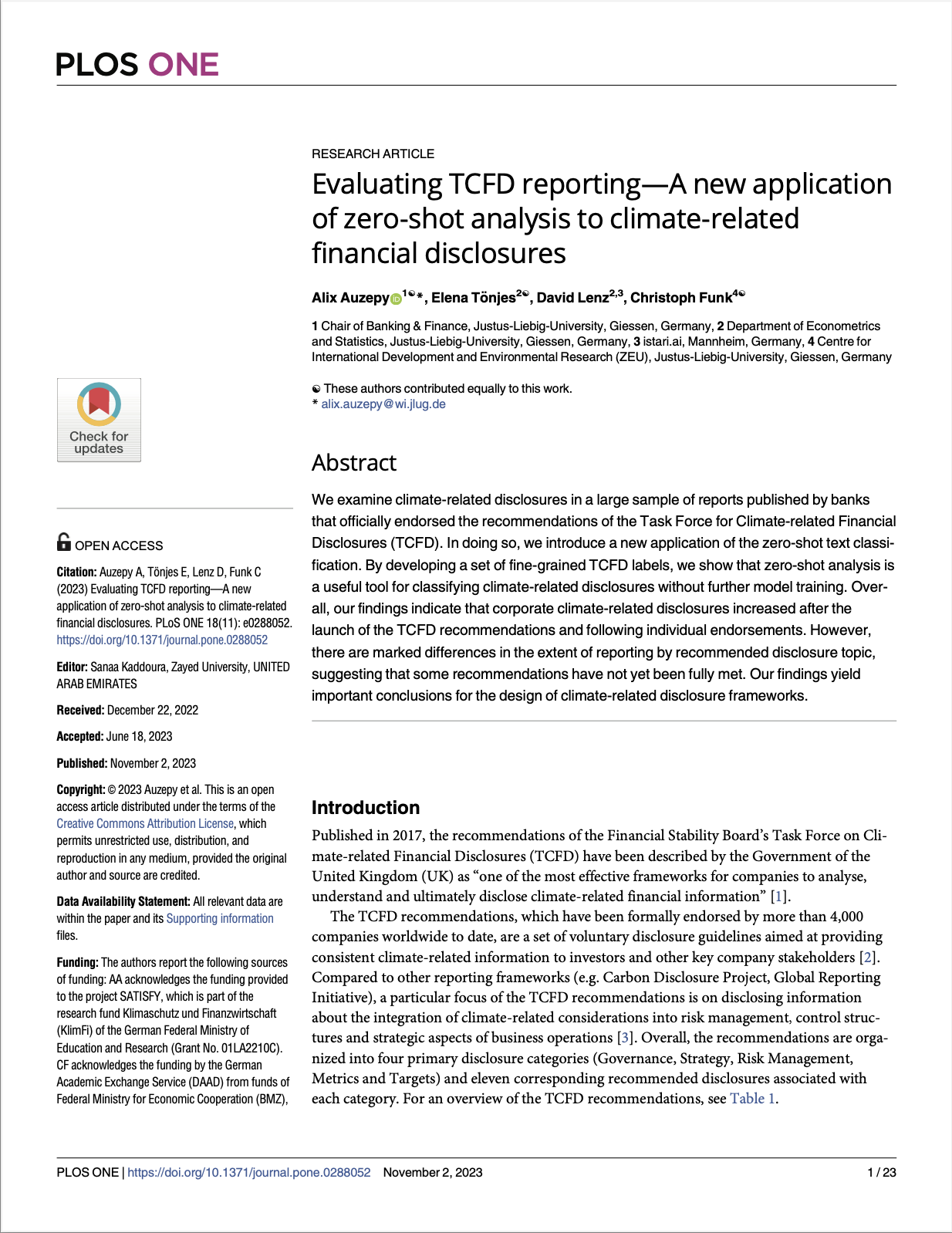
Evaluating TCFD reporting—A new application of zero-shot analysis to climate-related financial disclosures
We examine climate-related disclosures in a large sample of reports published by banks that officially endorsed the recommendations of the Task Force for Climate-related Financial Disclosures (TCFD). In doing so, we introduce a new application of the zero-shot text classification. By developing a set of fine-grained TCFD labels, we show that zero-shot analysis is a useful tool for classifying climate-related disclosures without further model training. Overall, our findings indicate that corporate climate-related disclosures increased after the launch of the TCFD recommendations and following individual endorsements. However, there are marked differences in the extent of reporting by recommended disclosure topic, suggesting that some recommendations have not yet been fully met. Our findings yield important conclusions for the design of climate-related disclosure frameworks.
- Veröffentlichungsdatum: 02.11.2023
- Autor:innen: Alix Auzepy, Elena Tönjes David Lenz & Christoph Funk
- Publikationsart: Research Article
- Link zum PDF-Dokument
SATISFY I Integrating Climate Risks in Bank Risk Management and Capital Requirements

Integrating Climate Risks in Bank Risk Management and Capital Requirements
This work aims to provide a detailed analysis of institutional practices and regulatory developments that we hope will be of value to academics, industry practitioners and policymakers engaged in this feld. By presenting concrete examples of approaches used by large credit institutions in the European Union, enriched with insights from risk experts, our study also provides guidance for the climate risk integration eforts of smaller credit institutions that may be in the early stages of their “journey”. Importantly, this work aims to paint an objective picture of current developments and does not advocate for a particular policy stance. As this book is the result of an extensive research project, its structure is similar to that of a research paper, including a comprehensive discussion of the theoretical background, covering key regulatory and supervisory developments, and a short literature review describing the empirical evidence on the growing relevance of climate risks for fnancial institutions and supervisors. Before presenting the results, a methodology section outlines the empirical approach and the conceptual framework that guides our analysis. We conclude with a discussion of limitations and recommendations for further research and policy initiatives.
- Veröffentlichungsdatum: 2025
- Autor:innen: Alix Auzepy, Christina E. bannier
- Publikationsart: Book
- Link zum PDF-Dokument
SATISFY I Klimafreundliche Gebäudefinanzierung: Risikomanagement und Transitionsplanung bei deutschen Banken
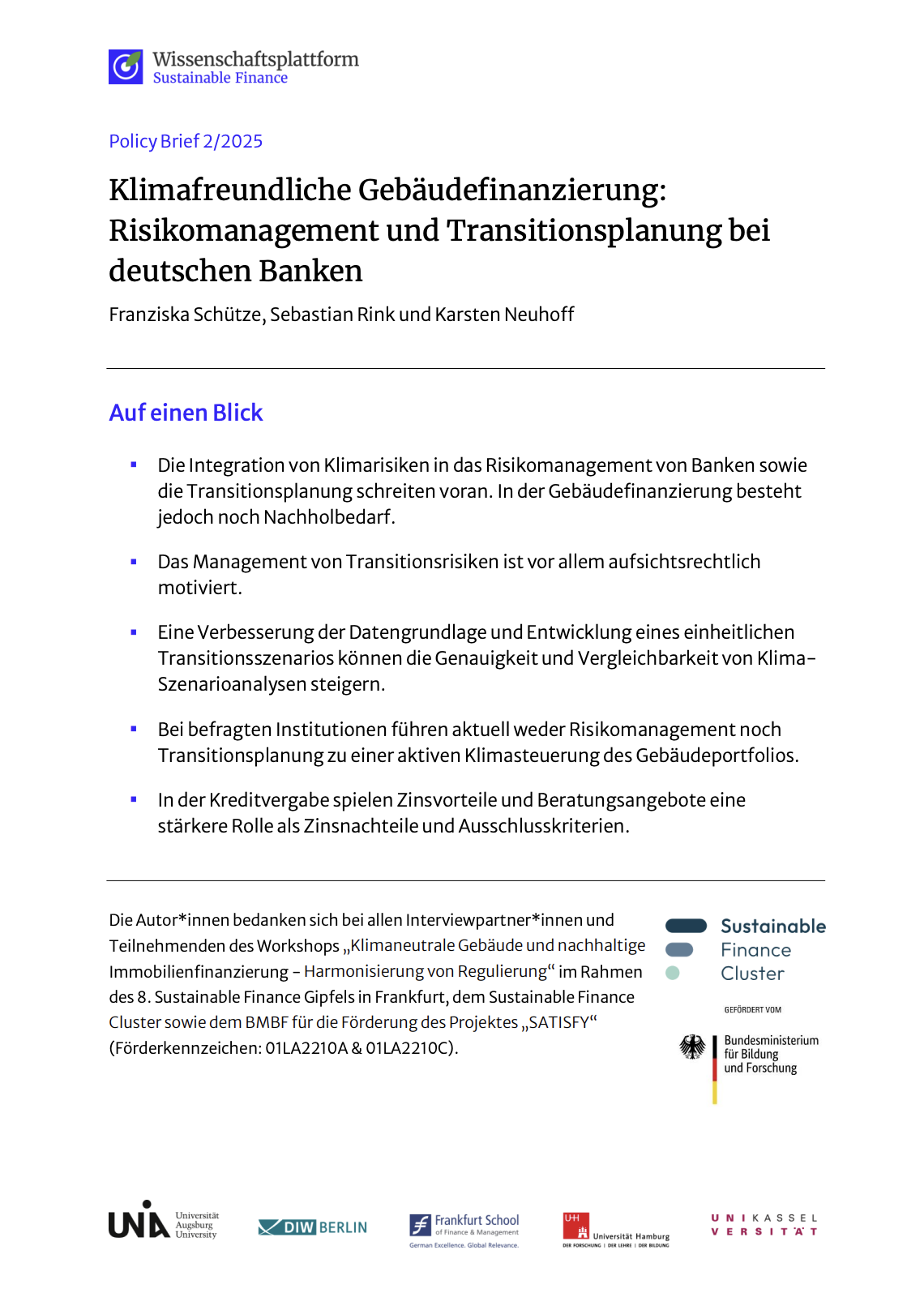
Klimafreundliche Gebäudefinanzierung: Risikomanagement und Transitionsplanung bei deutschen Banken
Die Integration von Klimarisiken in das Risikomanagement von Banken sowie die Transitionsplanung schreiten voran. In der Gebäudefinanzierung besteht jedoch noch Nachholbedarf. Das Management von Transitionsrisiken ist vor allem aufsichtsrechtlich motiviert. Eine Verbesserung der Datengrundlage und Entwicklung eines einheitlichen Transitionsszenarios können die Genauigkeit und Vergleichbarkeit von Klima-Szenarioanalysen steigern. Bei befragten Institutionen führen aktuell weder Risikomanagement noch Transitionsplanung zu einer aktiven Klimasteuerung des Gebäudeportfolios. In der Kreditvergabe spielen Zinsvorteile und Beratungsangebote eine stärkere Rolle als Zinsnachteile und Ausschlusskriterien.
- Veröffentlichungsdatum: Februar 2025
- Autor:innen: Franziska Schütze, Sebastian Rink und Karsten Neuhoff
- Publikationsart: Policy Brief
- Link zum PDF-Dokument
SATISFY I Machine Learning and Micro-Prudential Climate Stress Testing
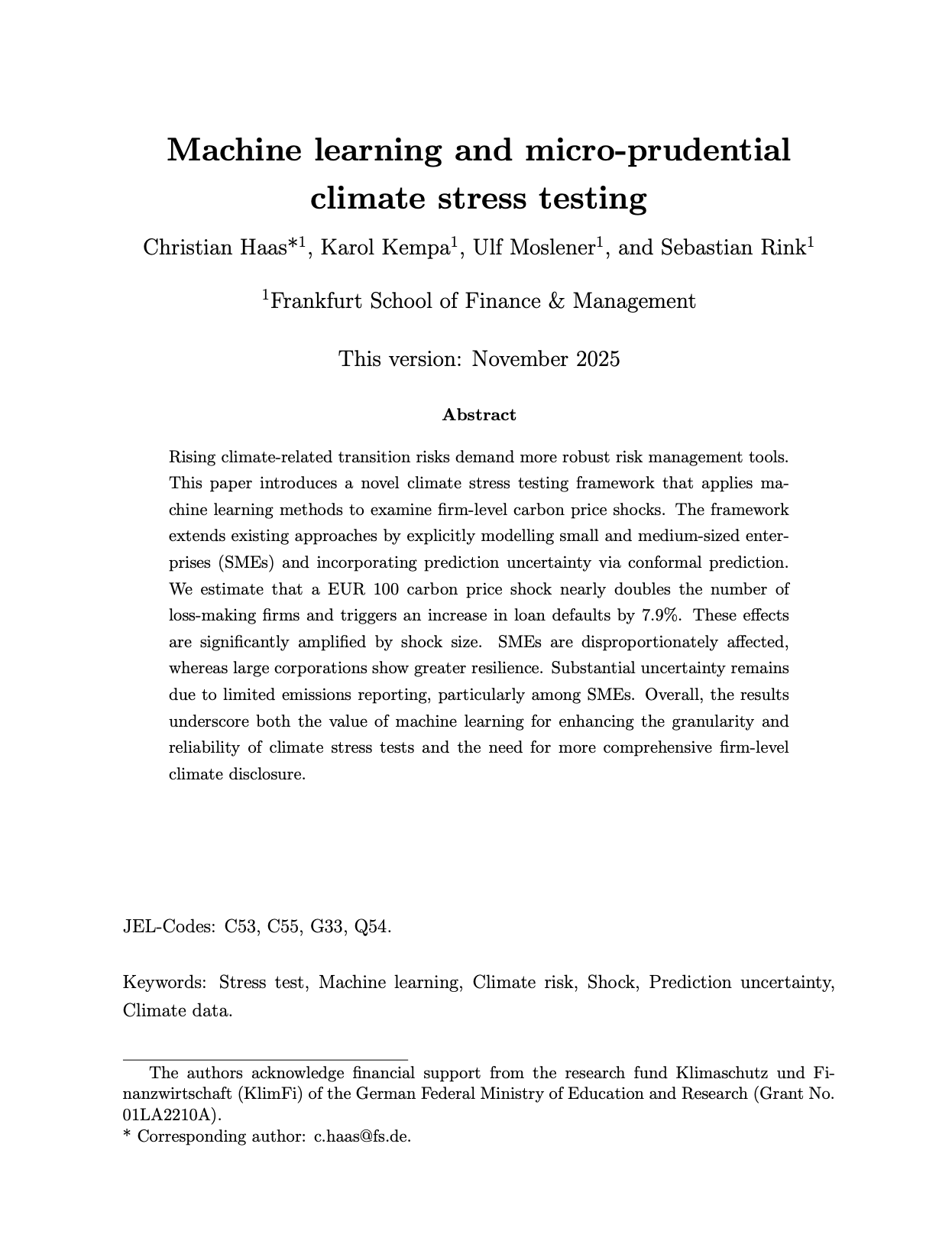
Machine Learning and Micro-Prudential Climate Stress Testing
Rising climate-related transition risks demand more robust risk management tools. This paper introduces a novel climate stress testing framework that applies machine learning methods to examine firm-level carbon price shocks. The framework extends existing approaches by explicitly modelling small and medium-sized enterprises (SMEs) and incorporating prediction uncertainty via conformal prediction. We estimate that a EUR 100 carbon price shock nearly doubles the number of loss-making firms and triggers an increase in loan defaults by 7.9%. These effects are significantly amplified by shock size. SMEs are disproportionately affected, whereas large corporations show greater resilience. Substantial uncertainty remains due to limited emissions reporting, particularly among SMEs. Overall, the results underscore both the value of machine learning for enhancing the granularity and reliability of climate stress tests and the need for more comprehensive firm-level climate disclosure.
- Veröffentlichungsdatum: November 2025
- Autor:innen: Christian Haas, Karol Kempa, Ulf Moslener & Sebastian Rink
- Publikationsart: Working Paper
- Link zum PDF-Dokument
SATISFY I Scenario Analysis for Net Zero: The Applicability of Climate Neutrality Studies for Transitioning Firms in the German Building Sector and Energy-intensive Industry
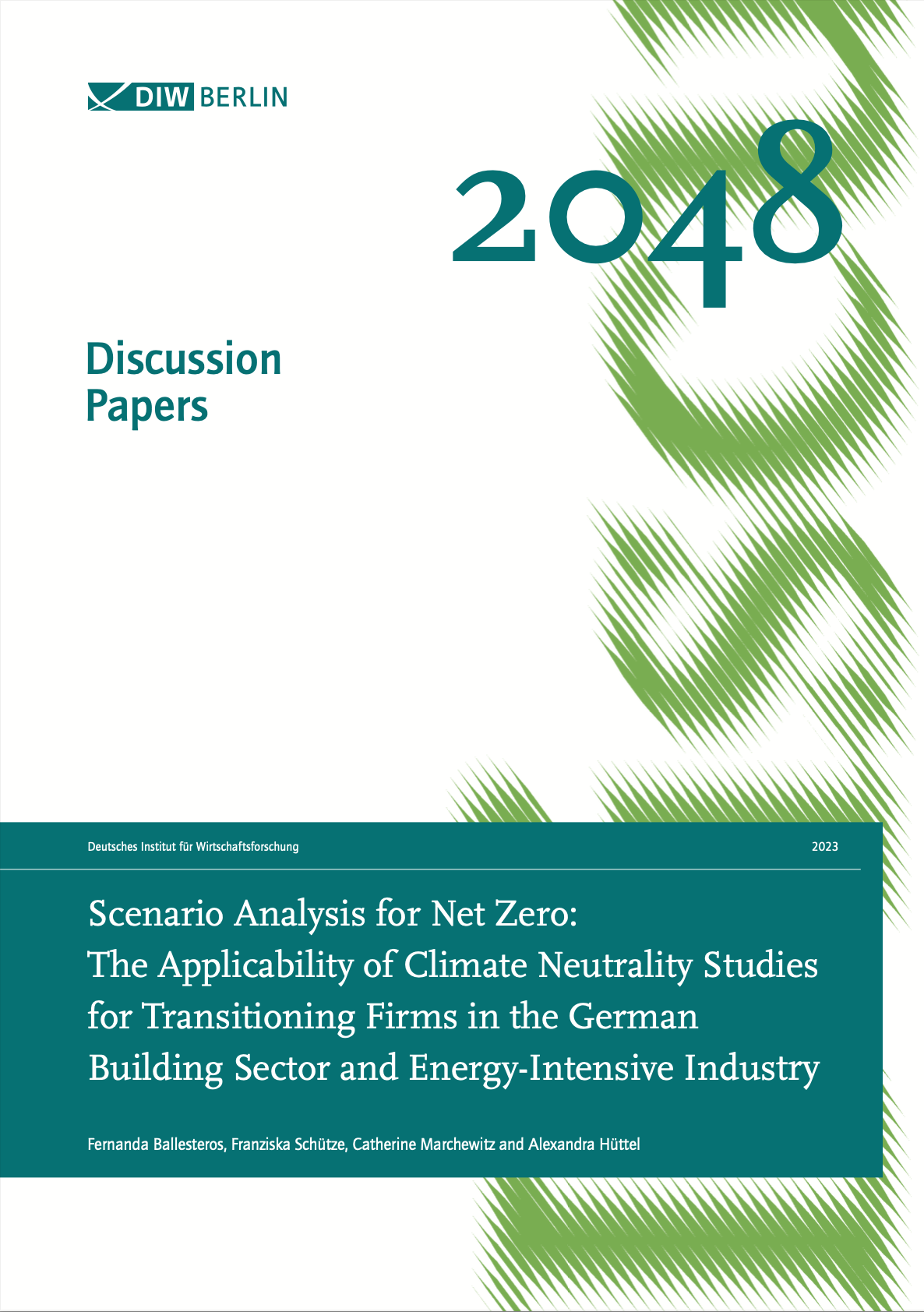
Scenario Analysis for Net Zero: The Applicability of Climate Neutrality Studies for Transitioning Firms in the German Building Sector and Energy-intensive Industry
Various stakeholders are increasingly encouraging companies from the real economy to adopt measures facilitating their transition towards carbon neutrality. In this context, companies are expected to implement forward-looking strategies and climate-related reporting practices using scenario analysis aligned with scientific evidence and credible pathways to net zero carbon emissions. This paper examines the potential of scenario analysis as an element for transitioning to net zero. We review and compare eight existing economy and sector level climate neutrality studies for Germany that were published between 2019 and 2021, analysing their respective applicability as a science-based reference scenario for companies to strengthen strategy development and forward-looking reporting practices. Using the logical framework approach, we assess relevant transition indicators like technologies, energy and resource efficiency, carbon pricing, and other steering instruments for the building and energy-intensive industry sectors. These indicators measure progress towards climate neutrality and could be included as a crucial component in transition plans. We find that, although modelling approaches for the studies differ, they often converge on similar results that can partially be translated to indicators at the firm level and, thereby, may serve as reference scenarios for their transition planning.
- Veröffentlichungsdatum: 2023 (Revised version – 15 January 2025)
- Autor:innen: Fernanda Ballesteros, Franziska Schütze, Catherine Marchewitz & Alexandra Hüttel
- Publikationsart: Discussion Paper
- Keywords: Climate Change, Scenarios Analysis, Decarbonization, Sustainability Reporting, Transition Plans, Sectoral Pathways
- Link zum PDF-Dokument
SATISFY I Sustainable Small Business Lending

Sustainable Small Business Lending
Banks are the main source of external funding for small businesses. Thus, integrating sustainability considerations in small business lending can support global sustainability efforts. In surveying German banks, I show that banks are in the process of implementing sustainable small business lending. They put more emphasis on sustainability risks than on the transformation of the business model among small businesses. Sustainable relationship lending has some relevance in creating sustainability-related soft information, although respective hard information is preferred by banks. Banks and policymakers can use the findings to better apply sustainable small business lending to sustainability and resilience efforts.
- Veröffentlichungsdatum: Dezember 2024
- Autor:innen: Sebastian Rink
- Publikationsart: Paper
- Keywords: Climate Change, Scenarios Analysis, Decarbonization, Sustainability Reporting, Transition Plans, Sectoral Pathways
- Link zum PDF-Dokument
